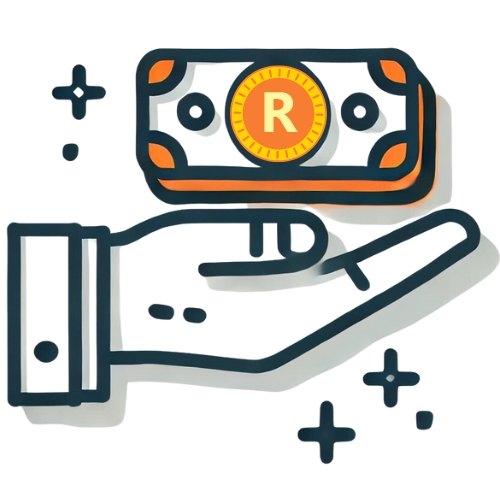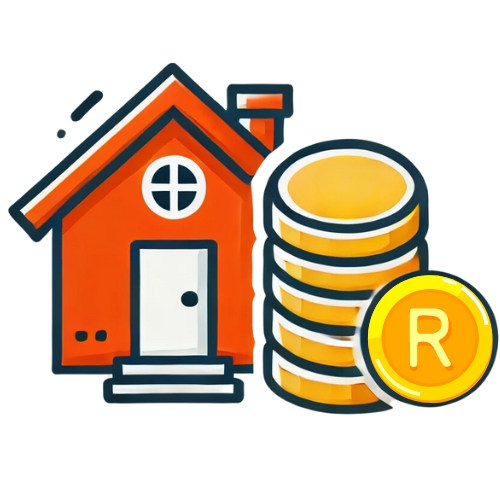
When considering a loan, understanding how much you qualify for based on your salary is essential for making informed decisions. If you’re planning to buy a home, finance a car, or cover personal expenses, lenders in South Africa look at several factors to determine how much you can borrow. These factors include your income level, credit score, employment status, and existing financial obligations.
Key Takeaways
- Loan Qualification Depends on Multiple Factors: In South Africa, your salary plays a central role in determining loan eligibility, alongside your credit score, employment status, and debt-to-income ratio. Lenders typically limit repayments to 30%–35% of your gross salary to ensure affordability.
- Interest Rates and Insurance Costs Impact Affordability: Fixed or variable interest rates and mandatory loan insurance premiums directly influence monthly repayments. Higher salaries often provide access to more favourable rates and terms.
- Improving Eligibility is Possible: Strengthening your credit profile, reducing existing debt, and stabilising irregular income can enhance your loan qualifications, increasing the amount you may borrow while ensuring manageable repayments.
Understanding Loan Eligibility in South Africa
How Lenders Assess Income
Lenders evaluate both your gross and net income when determining loan eligibility. Gross salary, which represents your total earnings before deductions such as taxes, pension contributions, and medical aid, typically establishes the upper limit of the loan amount you might qualify for. Net salary, on the other hand, is your income after these deductions and is used to assess your ability to make monthly repayments. Lenders prioritise the net figure to ensure that your repayments are manageable within your budget.
For salaried employees with consistent monthly earnings, this assessment is relatively straightforward. However, for individuals with irregular income, such as commission-based earners or freelancers, lenders may take an average of income over a set period, usually six to twelve months, to determine reliability. In some situations, additional documentation might be required to verify income stability and ensure repayment feasibility.
Debt-to-Income Ratio (DTI)
The Debt-to-Income (DTI) ratio is a critical metric used by lenders to measure your existing financial obligations relative to your income. It is calculated by dividing your total monthly debt payments by your gross monthly income and expressing the result as a percentage.
A high DTI ratio suggests that you may struggle to afford additional debt, whereas a lower ratio indicates a stronger capacity to manage loan repayments.
In South Africa, most lenders prefer a DTI ratio below 30%–40%. For example, if your gross monthly income is R20 000, your monthly debt repayments (including the proposed loan) should not exceed R6 000–R8 000. Certain lenders may allow exceptions for borrowers with strong credit profiles or higher disposable income.
Credit Profile
Your credit score significantly influences your borrowing capacity, as it serves as an indicator of your creditworthiness, derived from your financial habits, such as timely repayments, debt levels, and account history.
- Higher credit scores result in better loan terms, such as higher borrowing limits and lower interest rates.
- Lower credit scores may limit the loan amount or lead to applications being declined altogether.
While each lender has its criteria, a credit score of at least 580–650 is generally required to secure most loans. Scores above 700 often qualify for premium loan offers. Borrowers with poor credit can explore secured loans or work to improve their scores before applying.
Did you know you can check your credit score for free? Regularly monitoring your score ensures you’re in control of your financial health and can catch any errors before applying for a loan.
Affordability Checks
Affordability checks are used to ensure that borrowers can manage their loan repayments without financial strain. These checks consider your:
- Net income after deductions.
- Monthly expenses, including rent, utilities, insurance, and existing debt obligations.
- Loan repayment terms, such as interest rates and repayment duration.
Affordability assessments directly impact the maximum loan amount offered. If your monthly expenses consume a large portion of your net income, the loan amount will be adjusted downward to prevent over-indebtedness. For instance, a borrower with limited disposable income may qualify for a smaller loan with lower
Your salary plays a major role in determining your loan eligibility. But which bank offers the most favourable terms for your income level? Find out more about the Best Bank for Personal Loan in South Africa and secure the ideal loan for your financial situation.
About Arcadia Finance
Arcadia Finance makes securing your loan easy and hassle-free. With no application fees and a choice of 19 trusted lenders, all compliant with South Africa’s National Credit Regulator standards, you’re assured of reliable and personalized financial solutions.
Loan Types and Their Salary Requirements

Personal Loans
Personal loans are a popular choice for individuals needing funds for a variety of purposes, such as debt consolidation, medical expenses, or home improvements. The income threshold for personal loans typically varies depending on the lender, but most require a stable monthly income of at least R5 000 to R10 000.
The maximum loan amount offered is largely influenced by the borrower’s salary range and repayment capacity. For example, individuals with higher net incomes may qualify for larger personal loans, often up to R350 000 or more. However, affordability assessments, including your debt-to-income ratio and existing obligations, play a key role in determining the final loan amount.

Home Loans
Home loans, or mortgages, are tailored for property purchases and come with stricter income requirements due to the high loan amounts involved. The required salary depends on the value of the property and the repayment terms. For instance, a borrower seeking a loan for a property worth R1 000 000 would typically need a monthly gross income of at least R25 000 to R30 000, assuming no significant existing debts.
The loan-to-value (LTV) ratio is also a critical factor. Lenders often finance up to 90% or 100% of the property value, but the borrower’s income must support the repayment of the loan. Higher salaries often allow borrowers to access better LTV ratios and terms, particularly when paired with strong credit scores.

Vehicle Finance
Vehicle finance is designed for purchasing cars and generally requires borrowers to meet specific income thresholds. Lenders typically prefer applicants with a stable gross monthly income of R7 500 or more, although this can vary based on the cost of the vehicle and repayment terms.
The repayment period for vehicle finance is often between 36 and 72 months, and a borrower’s income directly impacts the loan amount and monthly instalments. For instance, a higher salary enables access to larger loans or more affordable repayments on premium vehicles. Additionally, lenders may include other costs such as insurance in the affordability assessment, further highlighting the importance of a sufficient income to cover all associated expenses.
Calculating Loan Amount Based on Salary
South African lenders usually follow the 30%–35% rule, which means your monthly loan repayments should not exceed 30%–35% of your gross salary. This ensures that borrowers are not overburdened by debt and can comfortably manage their repayments alongside other financial obligations.
To understand how salary influences loan qualification, consider the following scenarios:
For a monthly salary of R10 000, the maximum repayment typically allowed is between R3 000 and R3 500, translating to an estimated loan qualification of R50 000 to R70 000, depending on the interest rate and loan term.
For someone earning R25 000 per month, the maximum repayment amount is usually between R7 500 and R8 750. This equates to a potential loan qualification of approximately R120 000 to R150 000.
Finally, for salaries exceeding R50 000 per month, the allowable repayment range is R15 000 to R17 500, with a likely loan qualification of R300 000 or more, subject to terms and creditworthiness.
Earning R20,000 per month may sound great, but is it enough to get approved for a substantial loan? Before making any financial commitments, read R20 000 Monthly Income? Important Warning for South Africans! to find out if your income is truly working in your favour.
Online Loan Calculators
Many lenders and financial institutions in South Africa offer online loan calculators that provide a quick and convenient way to estimate how much you can borrow. These tools require you to input basic information such as your gross salary, monthly expenses, and desired loan term.
Online loan calculators typically take the following into account:
- Income and Expenses: Your gross income and recurring monthly expenses.
- Interest Rate: The assumed or actual rate, which significantly impacts affordability.
- Loan Term: The repayment period, usually ranging from 1 to 30 years, which affects monthly instalments and total borrowing capacity.
- Other Costs: Some calculators also factor in additional costs like insurance premiums and administrative fees.
Do you know the difference between being pre-qualified and pre-approved for a loan? Understanding these terms can help you set realistic expectations and avoid surprises during the application process.
No hidden fees, free application – no commitment

How Salary Affects Loan Repayments
Monthly Repayment Estimates
Loan repayments are calculated based on the principal amount borrowed, the interest rate, and the repayment term. For example, borrowing R100 000 at a fixed interest rate of 10% over five years could result in monthly repayments of approximately R2 125. For a larger loan of R300 000 under the same terms, the repayment might increase to around R6 375 per month.
These estimates can vary depending on specific lender terms, but they demonstrate how the loan amount directly impacts repayment obligations. Lenders ensure that these monthly repayments align with your income to prevent financial strain.
Impact of Interest Rates
Interest rates significantly influence the total cost of a loan and your monthly repayments. Depending on your credit profile and the type of loan, lenders may offer fixed or variable interest rates. Fixed interest rates provide consistent repayments throughout the loan term, which can make budgeting easier. In contrast, variable rates may start lower but can fluctuate over time, potentially leading to higher payments. Your salary affects the rate you may qualify for, as higher income levels often indicate a lower risk for lenders, resulting in more favourable rates.
Insurance Costs
Many lenders require borrowers to take out insurance to cover the loan in case of unforeseen circumstances such as death or disability. These premiums are typically added to your monthly repayments. For example, an additional R300 to R800 per month may be required for loan protection insurance, depending on the loan size and term. Your salary must accommodate these extra costs, making it a key factor in determining overall affordability.
Improving Your Loan Eligibility with Your Salary
- Enhancing Your Credit Profile: A strong credit profile demonstrates reliability to lenders. To improve your credit score, ensure that you pay all debts on time, reduce your credit utilisation, and avoid applying for multiple loans simultaneously. Regularly checking your credit report for inaccuracies can also help maintain a healthy score.
- Lowering Your Debt Obligations: Reducing your existing debts lowers your debt-to-income ratio, which lenders use to determine your borrowing capacity. Paying off smaller debts first or consolidating high-interest loans into a single, lower-interest payment can free up more of your income for future loan repayments.
- Consolidating Irregular Income: If your income fluctuates, stabilising it can improve your loan eligibility. This might involve setting aside earnings during high-income months to cover lean periods or documenting a steady income history over time to reassure lenders. Consistent income makes it easier to meet affordability requirements and improves your borrowing potential.
Conclusion
Knowing how much loan you qualify for with your salary is essential for making informed financial decisions. By considering key factors such as income, credit score, and debt-to-income ratio, South African borrowers can estimate their borrowing capacity and approach lenders confidently. Tools like online calculators and affordability checks offer helpful starting points, but consulting directly with financial institutions provides the most accurate assessments. With proactive steps to improve your credit profile and manage debt, you can maximise your loan eligibility while ensuring repayments remain within your budget.
Frequently Asked Questions
Most lenders in South Africa recommend that your monthly loan repayments do not exceed 30%–35% of your gross salary to ensure manageable debt levels.
Yes, borrowers with irregular income, such as freelancers or commission earners, can qualify for loans. Lenders may average your income over six to twelve months and require additional documentation to assess stability.
Your credit score directly impacts your borrowing capacity and the terms offered by lenders. A higher score increases your chances of qualifying for a larger loan at a lower interest rate, while a lower score may limit your options.
The minimum salary required varies by lender and loan type, but most lenders in South Africa require a stable income of at least R5 000 to R10 000 per month for personal loans.
Yes, lenders may require you to pay loan protection insurance premiums, and interest rates will also influence the overall cost. It’s important to factor these costs into your budget when calculating affordability.





